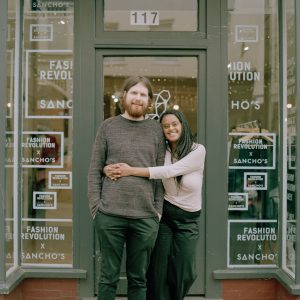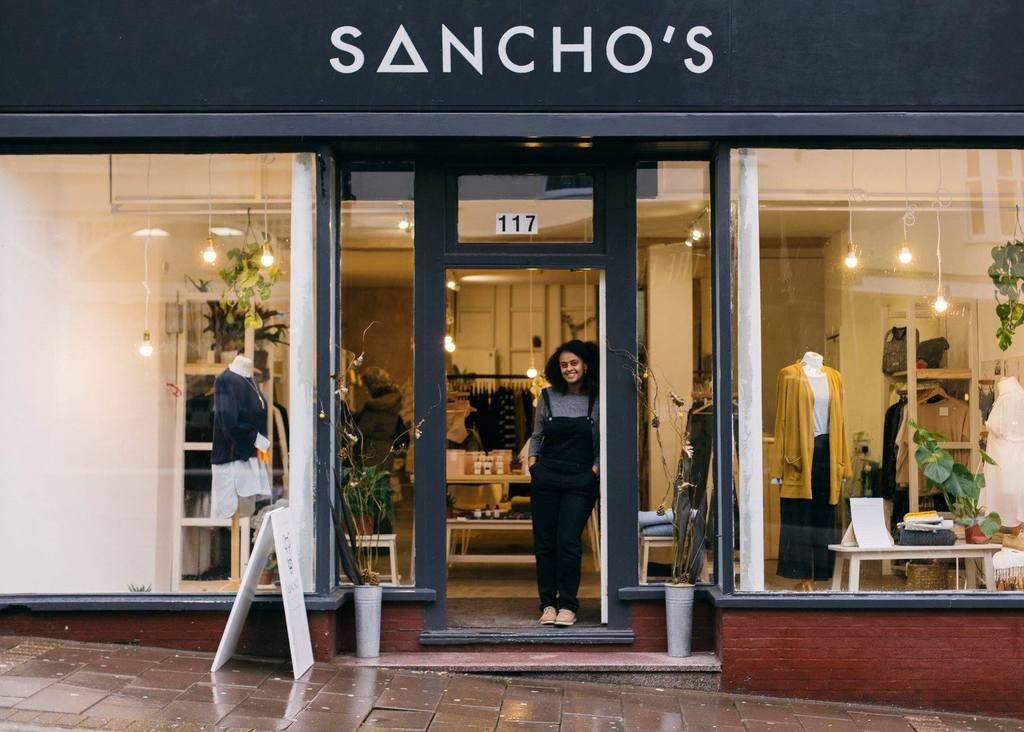Q&A: Starting a Sustainable Business
Kalkidan Legesse is Founder and Managing Director of Sancho’s – an ethical, sustainable fashion and lifestyle business, with a shop on Exeter’s Fore Street and an online store. She started her business straight after university and has now been named one of Drapers Magazine 30 under 30 2021 (celebrating fashion’s rising stars), with Sancho’s becoming the 2020 Winner of Independent Shop Of The Year @ Holly & Co. We caught up with Kalkidan earlier on in her journey, when she told us about the motivation behind starting her business, and how she found the process as a new graduate. Read her inspiring story…

Tell us about Sancho’s
Sancho’s is an ethical clothing and lifestyle shop. We curate collections from well-known sustainable brands as well as small makers working from home. We have strict buying criteria – we look for garments, accessories and lifestyle products that are made in a certain way, where people are paid a decent wage and where there’s transparency in the production cycle and model.
What that means for our consumer is they can trust that all of our products are made fairly and ethically. That reflects the kind of world we want to see. So, Sancho’s is a brand where you can start to navigate the way you want the world to be, through your clothing. We also want to make sure that you feel welcome in the fashion industry, that you enjoy what you wear, and you find yourself beautiful.
What inspired you to start a sustainable business?
Whilst I was at Exeter uni studying PPE, I had a particular interest in sustainability, and as an Ethiopian migrant to the UK, I have always had a sense that my life had to have a role in sustainable development. Whilst in my third year, I worked for NGO’s in Ethiopia. One of my first steps in starting the business was to bring back beautiful items from Ethiopia, to start discussions about the variety of things available, and change perceptions of the country.
In addition to that, by selling these items, we were able to start sending hard currency back to Ethiopia. My auntie lost her husband, and it became difficult for her and her family to live day to day. But she’s a fantastic crafter, so we devised a plan where she would weave scarves and I would sell them. And we managed to quadruple her income and put her last two children through school. So that’s how we started, with Scarves for Sustainability. And over time, we have found other projects around the world that we are passionate about and that are producing stunning, high quality, long lasting garments, but also slowly lifting people from unnecessarily difficult lives.
How did you start Sancho’s after graduating?
Exeter City Council was offering retail space for local independent businesses to set up pop up shops. My partner Vidmantas and I decided to take it. Although it was a really good space, it had not been well cared for. We had just three weeks until it opened, so Vidmantas prepared the shop, while I took a very long, cheap flight to Ethiopia to buy stock from local markets, like scarves, baskets and boxes, a whole range of things.
We had three months there, which we spent having parties, meeting people and understanding what it means to work for yourself day to day. It was wonderful. It helped us feel rooted.
Looking back now, I think everyone has a sense of confusion just after they graduate, while they try to figure out what they want to do, what really matters to them, and not just their careers but how they want their life to take shape. For us, I think those three months were an invitation to see what life could be like in this city, becoming business owners. And we loved it. We had a lot of fun and made just enough money to do a bit more of it. So we opened up our first shop in Fore Street.
What is your working environment like?
We tried everything to start with, working from home in the bedroom, the kitchen, in the small storage area at the back of the shop. Then we rented a co-working space. For a while, we didn’t feel like we were doing legitimate work unless we were in a proper office. It felt good to be amongst other people and led to valuable collaborations, but we overpaid for a space where we probably spent only 10% of our time. Eventually, we moved to our current shop because it has a decent workspace.
In our partnership, I take creative direction – design, sales, marketing, buying and Vidmantas deals with the financial management – cash flow, budgets, payroll. It’s about the right amount for someone who’s prepared to work hard, but not burn out. Both are crucial aspects of a business, and nobody can do everything, so our partnership works well and I think we’re very lucky.
How have you got noticed in such a competitive market?
It has taken time. But nothing beats persistence! We set high standards for ourselves. We are a small business, but we take the way we present ourselves very seriously, especially on social media. We work really hard to make sure that our images and content are comparable if not better than other trusted brands out there.
Sure, every time there’s a new competitor, you have a bit of a panic attack. But there’s room for us all in the market. And we’re very aware that your relationship with your customers is of paramount importance.
How did you build up your business?
Just buying and selling smartly and always watching our costs. Taking advantage of opportunities. The key component is learning from what’s happened. Looking through data – we found that record-keeping is really valuable, because that makes the learning process easier.
What’s the best part about running your own business?
Freedom! If you’re prepared to work hard, it can be very fulfilling. You can have an idea and just will it into fruition. Actually, it’s not so complicated: you need a clear objective, and then plan back the details until you have a specific journey to reach your goal. And that means anything is possible, which is very liberating.
The business has given me a wonderful way to work in sustainable development, but also to be part of the local community and have an outlet for creative expression. And it’s been great for our relationship. It has given me far more than one might expect to get from running a business.
It doesn’t take anything particularly special to start a business. I would like for more people to realise that they can do it, naturally and gradually. The concept that you have to have a detailed plan, all the money ready and lots of experience before you start a business probably creates a huge barrier for a lot of people. We started with just £1500, that we saved from selling scarves, working as waiters etc.
What’s the hardest part?
It’s a lot of hard work! We often work 12 hour days. You are responsible for everything. And it’s going to take a lot of your time – don’t underestimate that. We’ve been lucky we have seen relatively easy growth.
If you haven’t worked for a company before and don’t have industry experience to fall back on, I would suggest having some advisers for your business, whether that’s informally or formally – it could just be friends – so that you can ask advice if you are facing a challenging situation. I would say it’s better to have some experience, but there are different ways to draw on experience.
Was it hard when you first graduated, seeing your friends take a more ‘normal’ route, settling into big companies?
Yes. Everyone seemed to be doing really well and it did feel worrying for a while. Of course, you compare yourself to others and wonder if you have made the right decision. I was really nervous about it. But that’s the value of a partnership – when I had doubts, Vidmantas would encourage me to look at the opportunities. We realised that although there are costs now, they are going to pay back in the long run, so why not give it a go? Once we accepted that, we stopped comparing ourselves to others. Life spans are very broad, people have so many different experiences, accomplishments and challenges, So, we have overcome that.
How do you deal with knockbacks?
I haven’t always dealt with it very well! But I think I’m better now. And that’s because you learn to plan for contingencies and variables. If you are planning carefully, there is nothing to worry about.
What are your hopes for the future?
Ethical means paying a fair living wage and thoughtful production. Sustainability focuses on the longevity of garments, how they are formed (from organic, recycled and regenerative materials) and what happens after the consumer is done with them. Hopefully in the future we will stop seeing waste as a cost and more of a resource. I’d like to see more of the objectives of sustainable fashion written into policy, so we see an industry-wide change.
Thank you Kalkidan!
Kalkidan is currently developing Shwap, a digital resale platform for sustainable fashion brands. She is also an advocate for anti-racist strategy and intersectional environmentalism through her writing, social media and how she runs her business.
Visit Sancho’s
Sancho’s shop: 117 Fore Street, Exeter EX4 3JQ
Website: sanchosshop.com
Instagram: @wowsancho
Facebook: @sanchosshop
Find out more:
Grad Bites: Ethical Sustainable Fashion
Kalkidan tells the story behind Sancho’s, what the business stands for and what she would like to see for the future of fashion.

